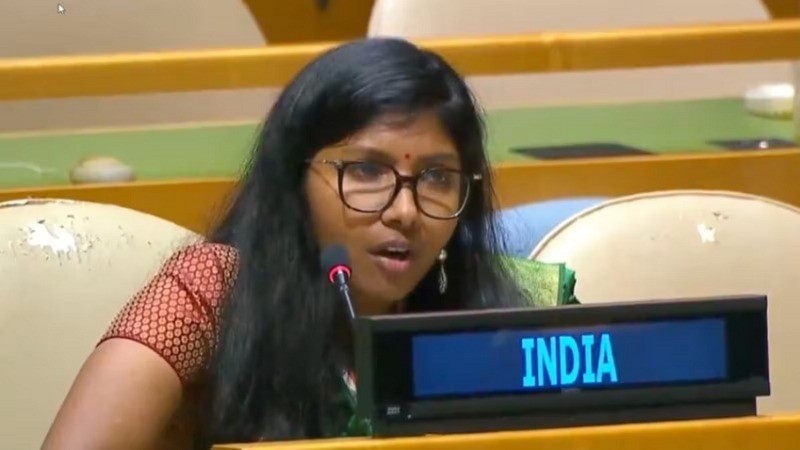
India issued a stern response at the United Nations General Assembly after Pakistan Prime Minister Shehbaz Sharif raised the Jammu and Kashmir issue during his speech. India warned that Pakistan's ongoing support for cross-border terrorism would "inevitably invite consequences."
India’s First Secretary to the UN, Bhavika Mangalanandan, delivered a strong rebuttal, accusing Pakistan of being deeply involved in global terrorism and using cross-border terrorism as a state policy. Her remarks came in response to Sharif's demand for India to reverse the 2019 abrogation of Article 370, which had granted special status to Jammu and Kashmir, and his call for dialogue between the two nations.
"This Assembly regrettably witnessed a travesty this morning. A country run by the military, known worldwide for terrorism, narcotics trade, and transnational crime, has dared to attack the world's largest democracy," Mangalanandan said. "The world can see for itself what Pakistan really is."
She criticized Sharif's speech as audacious, highlighting Pakistan's international reputation for terrorism and transnational crime. She cited attacks orchestrated by Pakistan-based groups, including the 2001 Indian Parliament attack and the 2008 Mumbai attacks, to emphasize Pakistan's continued involvement in terrorism.
Mangalanandan further said that Pakistan's "fingerprints" are on numerous terrorist incidents globally. "It should come as no surprise that its prime minister would speak as he did in this hall. Yet, we must make clear how unacceptable his words are to all of us," she said. "Pakistan will try to counter the truth with lies, but repetition will change nothing. Our position is clear and needs no reiteration."
India reiterated that any discussion of a "Strategic Restraint Regime" with Pakistan is meaningless unless terrorism is eradicated. Mangalanandan stated, "There can be no compact with terrorism." She also pointed to Pakistan's history of harboring terrorists, including Osama bin Laden, and its connections to various global terrorist incidents.
Sharif, in his address, linked the Kashmir issue with regional peace and accused India of military expansion aimed at Pakistan. However, Mangalanandan highlighted Pakistan's history of interference in Jammu and Kashmir through terrorism, aimed at disrupting the democratic process in the region.
India's response extended to Pakistan’s internal issues, including accusations of human rights abuses, the 1971 genocide in Bangladesh, and persecution of minorities. Mangalanandan called it "ridiculous" for Pakistan to lecture the world on intolerance, given its own record.
Pakistan responded with a Right of Reply, rejecting India’s claims as "baseless and misleading" and reiterated its call for a referendum in Jammu and Kashmir, as outlined in UN Security Council resolutions.
Protesters Demand Resignation of Muhammad Yunus at UN General Assembly
What Did PM Modi Discuss with Kuwait and Palestine Leaders at UNGA?
India and Bangladesh Set for Key Talks at UNGA Amid Political Turmoil